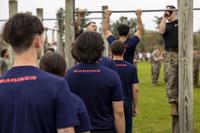Troops whose spouses use the Defense Department's military spouse scholarship program are more likely to stay in the service, while the scholarship users are more likely to be employed, according to a new landmark study on the program.
The Rand Corp. study, released Thursday, looks at the Defense Department's Military Spouse Career Advancement Account (MyCAA) scholarship program and those who were eligible for or used it between October 2010 and December 2011, when the current program first opened.
The Rand study compared qualifying spouses who used the program with those who did not, combining data from a variety of sources, including the Defense Department and the Social Security Administration, as well as unemployment statistics.
MyCAA grants the spouses of troops in paygrades E1-E5, O1-O2 and W1-W2 up to $4,000 for course work leading to an Associate's Degree or covers up to $4,000 in fees for professional license or certain types of certificates and certifications.
While more than 380,000 spouses were eligible for MyCAA during the study period, only about 35,000 used the program. But troops whose spouses did use the scholarship were six to eight percentage points more likely to stay in the military than those who did not.
"Of personnel who had three years of service in 2011, 43 percent whose spouses did not use MyCAA were still on active duty in 2014, compared to 52 percent whose spouses did use MyCAA," the report summary states.
Related: Squeeze Every Dime From MyCAA
"Those are pretty substantial retention differences," said David Knapp, a researcher who worked on the study.
Knapp said although the report looked at associated relationships, not causal relationships -- meaning that they could not completely rule out other factors that could have caused that retention difference -- the researchers were able to eliminate a variety of other issues that may have been an influence, such as deployments and other family changes.
The study also shows that spouses who completed a course of study using MyCAA were more likely to be employed several years after starting than those who did not. While the employment rate for all MyCAA eligible spouses fell steadily over time, the study found, those who studied through MyCAA were significantly more likely than their peers to be employed in 2013.
And despite public perception of for-profit schools, which in recent years have been the subject of intense scrutiny over the quality of their degree programs, the study also found that spouses who used for-profit institutions were more likely to be employed in 2013 than those who did not.
"Regarding institution type, known completers at private for-profit institutions were more likely to be working in 2013 than in 2009, while known completers at public nonprofit institutions were no more or less likely to be working in 2013 than in 2009," the report states. "This finding could reflect the longer educational programs on average in public nonprofit institutions but, importantly, at this point the results do not suggest worse outcomes for those attending for-profit private institutions."
Still, the completion rate of the program was not particularly high among those who started it. Of the about 35,000 spouses who were granted MyCAA during the study window, only about 34 percent are documented as completing their education track, while 44 percent lost their eligibility before their scholarship period was over. The remaining 22 percent did not complete their courses before December 2014 for unknown reasons.
Spouses of very junior troops and those who used schools that offered only online degrees were the most likely to drop out, the report found.
Researchers warned that the true completion rate could simply be hiding in uncollected data, since those who completed their education on their own after no longer qualifying for the scholarship were not tracked.
Knapp said officials could improve that completion rate by using the data they've collected over time on degree programs to advise new applicants on their degree plans.
"From my perspective, one of the great things they can do is they now have access to a huge body of data in terms of course of study, completion rates, failure rates -- a whole bunch of information that, when the spouses reach out to them, they can share," he said.
-- Amy Bushatz can be reached at amy.bushatz@military.com.













